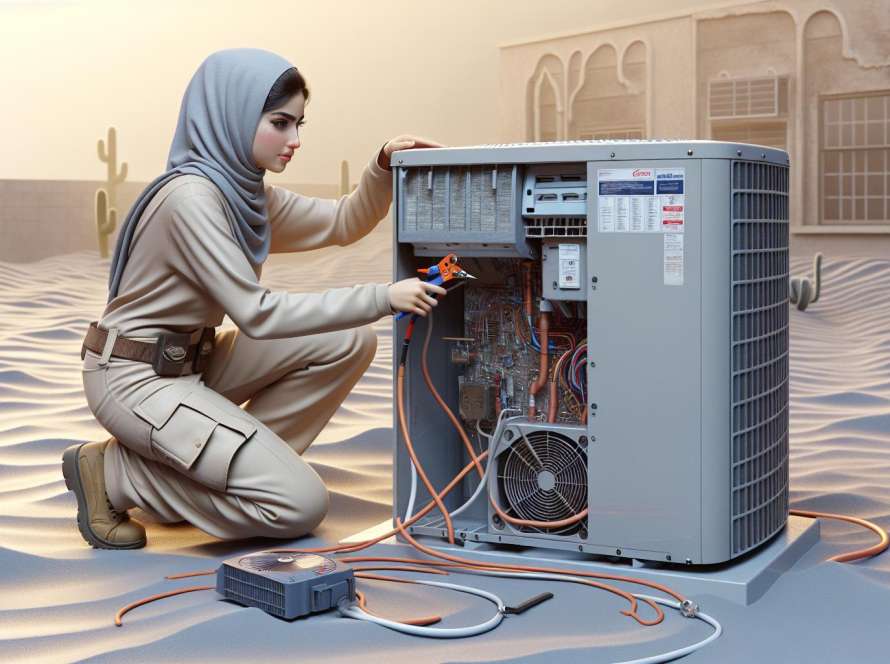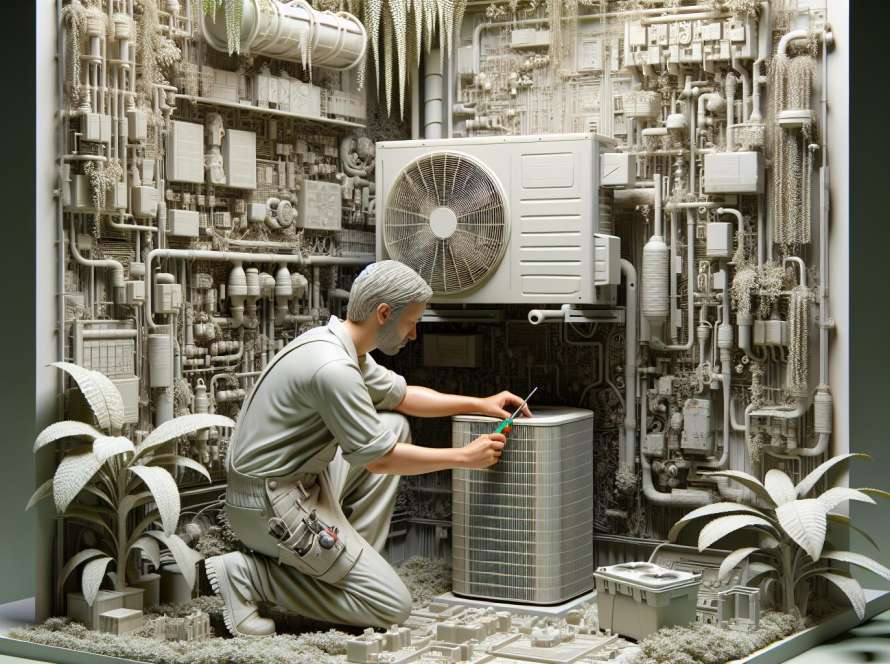So, we all know how unbearable it can get when the humidity levels soar, especially in the peak of summer. Our trusty AC units work overtime to keep us cool and comfortable, but in humid climates, they can face some serious challenges. That’s why it’s crucial for us to take proactive steps to maintain our AC efficiency and ensure it’s running at its best when we need it the most.
When humidity levels rise, our AC units have to work harder to remove moisture from the air, putting a strain on their efficiency and lifespan. But fear not, we’re here to share some expert tips and tricks on how to keep your AC unit in top shape, even in the most humid of climates. By following our simple yet effective maintenance strategies, we can all enjoy a cool and comfortable indoor environment without breaking a sweat. Let’s dive in and discover how we can beat the heat and humidity with a well-maintained AC system.
Importance of AC Efficiency in Humid Climates
In humid climates, efficient AC units are essential for maintaining a comfortable indoor environment. Here’s why AC efficiency is crucial in such conditions:
Why Efficiency Matters
- Prevents Overworking: Efficient AC units can handle the increased workload caused by high humidity without consuming excess energy.
- Energy Savings: An efficient system reduces energy consumption, leading to lower electricity bills.
- Improved Air Quality: Properly functioning AC units help maintain indoor air quality by effectively removing excess moisture.
- Longevity of Equipment: Well-maintained units have a longer lifespan, saving you money on premature replacements.
Tips for Maintaining AC Efficiency
For Beginners: Basic Maintenance
- Regular Cleaning: Keep the filters and coils clean to ensure proper airflow and efficiency.
- Setting Thermostat: Optimal temperature settings can help your AC run efficiently without straining.
- Professional Check-ups: Schedule annual inspections by HVAC professionals to catch any issues early.
For Intermediate Users: Enhancements
- Smart Thermostats: Invest in smart technology that adjusts settings based on humidity levels for optimal performance.
- Sealing Ducts: Properly sealed ducts prevent air leaks, aiding in maintaining consistent airflow.
- Consider Dehumidification: Supplement your AC with dehumidifiers for better moisture control.
- Upgrade to High-Efficiency Units: Invest in Energy Star certified models for maximum energy savings.
- Airflow Optimization: Ensure vents are unobstructed and consider adding ceiling fans to improve circulation.
- Routine Maintenance: Implement a detailed maintenance schedule including coil cleaning, refrigerant checks, and fan inspections.
Efficiency in AC units is not just about cooling; it’s about creating a comfortable, healthy environment even in the face of high humidity levels. Regular upkeep and strategic enhancements can make a significant difference in the performance and longevity of your system.
Understanding the Impact of Humidity on AC Performance

In humid climates, humidity levels have a significant effect on AC performance, influencing its ability to cool and remove moisture from the air efficiently. Here’s how humidity impacts your AC unit at different experience levels:
For Beginners: Managing Basics
- Humidity control: Set your AC to a comfortable level to balance temperature and humidity.
- Regular maintenance: Clean or change filters to improve airflow and overall efficiency.
For Intermediate Users: Enhancing AC Efficiency
- Optimal thermostat settings: Keep humidity levels in check while maximizing energy savings.
- Invest in dehumidifiers: Supplement your AC with a dehumidifier to reduce indoor moisture.
- Ductwork inspection: Ensure proper sealing to prevent humidity from entering the system.
- Upgrade to high-efficiency AC units: Consider models with enhanced dehumidification capabilities.
Remember, in high humidity conditions, addressing humidity levels is key to optimizing your AC performance and maintaining a comfortable indoor environment.
Tips for Improving AC Efficiency in Humid Climates
For Beginners: Mastering the Basics:
- Set your AC to a comfortable level to maintain efficiency.
- Schedule regular maintenance to ensure optimal performance.
- Replace air filters regularly for improved air quality and efficiency.
For Intermediate Users: Enhancing Your AC System
- Invest in a dehumidifier to reduce moisture levels in the air.
- Inspect ductwork for proper sealing to prevent cool air loss.
- Upgrade to high-efficiency AC units with enhanced dehumidification capabilities.
- Monitor thermostat settings for optimal performance in varying conditions.
- Consider zoning systems to control cooling in specific areas.
- Install programmable thermostats for customized cooling schedules.
| Fact | Data |
|---|---|
| Importance of Setting Comfortable AC Levels | Higher comfort & lower energy consumption |
| Benefits of Regular AC Maintenance | Improved efficiency & longevity of the unit |
| Impact of Dehumidifiers on Moisture Control | Reduced strain on the AC system & enhanced comfort |
Regular Maintenance Procedures for AC Units
For Beginners: Getting Started with Basic Maintenance
- Change air filters regularly to ensure proper air circulation and efficiency.
- Clean the evaporator and condenser coils to prevent dust and debris buildup.
- Inspect and clean the drainage system to avoid clogs that can lead to water leaks.
- Check thermostat settings for accuracy and optimal cooling performance.
For Intermediate Users: Advancing Your Maintenance Practices
- Schedule professional HVAC inspections annually to address potential issues early on.
- Seal any leaks in the ductwork to improve overall air quality and efficiency.
- Consider investing in a programmable thermostat for customized temperature settings.
- Regularly clean and lubricate AC components such as fan blades and motors for smooth operation.
- Upgrade to a high-efficiency AC unit with enhanced dehumidification capabilities.
- Install UV lights in the HVAC system to reduce microbial growth and improve indoor air quality.
- Opt for regular duct cleaning services to remove particles that can affect air quality.
- Monitor refrigerant levels and ensure they are within the recommended range for optimal performance.
| AC Maintenance Statistics |
|---|
| Regular maintenance can improve AC efficiency by up to 20%. |
| 71% of AC failures are attributed to lack of maintenance. |
| 90% of HVAC system failures are caused by dirt and dust buildup. |
Conclusion
Maintaining AC efficiency in humid climates is crucial for optimal performance. By following the recommended maintenance procedures, both beginners and intermediate users can ensure their AC units operate efficiently. Regularly changing air filters, cleaning coils, inspecting drainage systems, and monitoring thermostat settings are key steps. For more advanced users, scheduling professional HVAC inspections, sealing ductwork leaks, investing in programmable thermostats, and monitoring AC components are essential. Upgrading to high-efficiency units, installing UV lights, opting for duct cleaning services, and monitoring refrigerant levels can further enhance AC efficiency. Remember, regular maintenance plays a significant role in preventing AC failures and maximizing performance in humid environments.

